Liquid Web is a hosting company that has ten global data centers and currently manages over 500,000 sites. They offer VPS, Cloud, and dedicated server hosting. shared hosting, however, is not included in their services.
Most small businesses prefer shared hosting because it is cost-effective and performs well.
But, is there something to be said about VPS hosting, the most entry-level Liquid Web option? Might VPS hosting handle some issues that shared hosting isn’t able to cover? Is it worth the higher price?
That’s what we set out to discover for this comprehensive Liquid Web review. Before you lay down your money for their services, we want to make sure that you know what you’re getting into.
Should you host your website with Liquid Web?
General Info & Hosting Overview
| SPEED: | 338 ms (April 2020 to March 2021) |
| UPTIME: | >99.99% (April 2020 to March 2021) |
| SUPPORT: | 24/7 Live Chat, Phone, Helpdesk, Knowledge Base |
| APPS: | InterWorx, cPanel Pro, Plesk Web Pro |
| FEATURES: | Solid State Drives, Gigabit Bandwidth, Integrated Firewall, DDos Attack Protection, Cloudflare CDN, SSL Certificates, Built-In Backups, One-Click App Installs, and more. |
| HOSTING PLANS: | VPS, Cloud Hosting, Dedicated Hosting, CMS, and eCommerce Hosting |
| SITE TRANSFER: | Free |
| PRICING: | Starting at $15/month (with biannual payment) |
Pros of Using Liquid Web Hosting
Liquid Web has quite many perks going on for them.
Let’s have a more detailed look.
1. Free Email Accounts
When running a business, you’re going to have to correspond via email with colleagues, customers, partners, vendors, and more. A branded email address that matches your website domain goes a long way toward establishing your brand identity and instilling a sense of professionalism and confidence in the minds of those you interact with.
Thankfully, branded email accounts come free with Liquid Web’s VPS service. These accounts are managed through the Liquid Web control panel.
Oddly enough, this service is not listed prominently on the Liquid Web website. We had to inquire with customer support to get the details.
2. Responsive Live Chat Support
Liquid Web has three primary forms of customer support:
- 24/7 Live Chat
- Phone
- Helpdesk

The most efficient and fastest means of communication is live chat. According to different live chat studies, 51% of consumers say it’s important for a business to be available 24/7 for support. It’s been proven that fast customer support response time, including a positive chat experience, will increase sales numbers.
We tried out the live chat system ourselves and found a super-responsive service. We reached out to them twice, and each time we got an immediate response.

In case you’re not interested in the abovementioned three options of customer support, Liquid Web also has a wide knowledge base. There you can browse through different articles, tutorials and find answers for the most common fixes.
3. Great Uptime >99.99%
Liquid Web claims to have an average uptime of 100%. Most hosting providers will guarantee an uptime of 99.9% because you can’t account for things like natural disasters.
Claiming 100% uptime is something that you don’t see often in the hosting industry and of course, we’re not going to take their word for granted and tested their uptime ourselves.
We do this by building a website on the hosting platform and monitoring its uptime for several months. And in the past year, Liquid Web’s uptime has been as promised >99.99%, with only 11 minutes of downtime. They delivered a perfect 100% uptime almost every month, except January 2021 where the uptime was 99.99%.
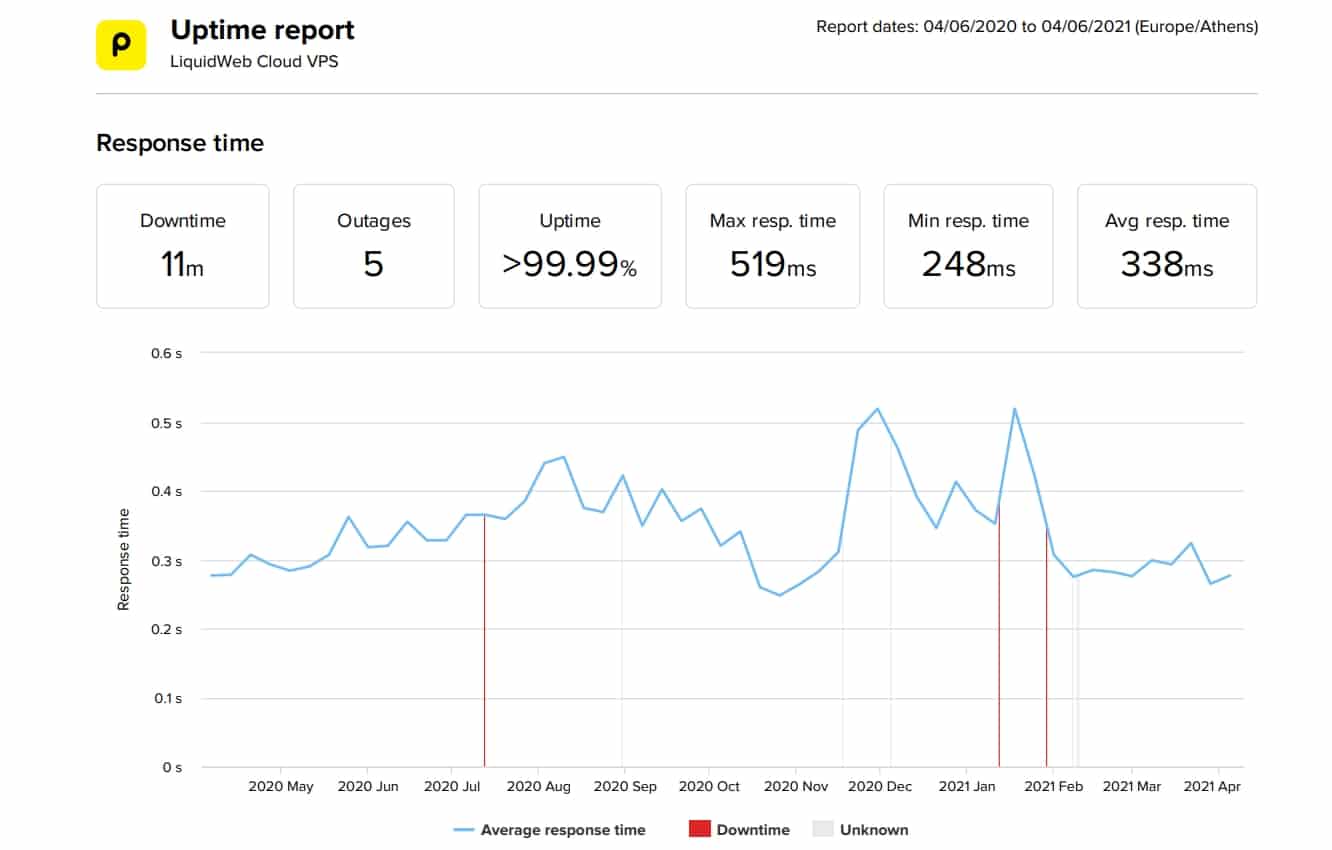
Here’s the last 12-months average uptime:
- March 2021: 100%
- February 2021: 100%
- January 2021: 99.99%
- December 2020: 100%
- November 2020:100%
- October 2020: 100%
- September 2020: 100%
- August 2020: 100%
- July 2020: 100%
- June 2020: 100%
- May 2020: 100%
- April 2020: 100%
4. Great Page Loading Speed – 338 ms
Liquid Web makes a lot of very bold claims on its website in regards to the speed of the sites that it hosts. The company claims to be 200% faster than DigitalOcean, AWS, and Rackspace.
Speed is one of the most important factors when choosing a website host. If your page takes too long to load, not only will potential customers abandon your site in droves, but popular search engines like Google won’t list you prominently.
For example, an average speed index for the desktop in 2020 is 4.7 seconds, and for mobile 11.4 seconds. However, Google’s best Practice Is to have a speed index below 3 seconds.
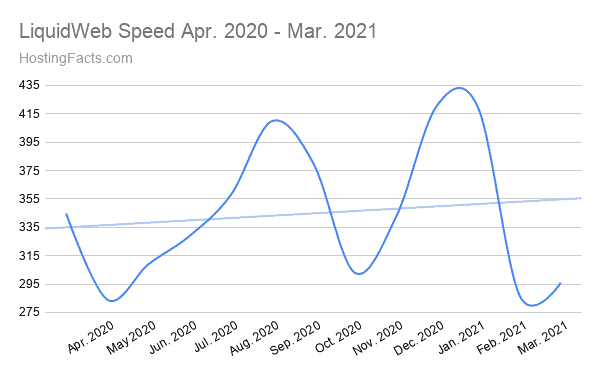
And once again, Liquid Web delivers on its promises with an average page loading speed of 338 ms. It’s one of the best in the hosting industry (not as fast as A2 Hosting, though).
5. Free SSL Security
An SSL certificate is a factor that dictates whether your website is an HTTP or HTTPS site.
What’s the difference?
HTTPS has advanced security, whereas HTTP is mostly unsecured and vulnerable to cyber-attacks. Google actually labels HTTP sites as unsecured, which is not going to look great to potential customers.
For example, if you have an eCommerce website that is not HTTPS, the browser will send all the information to the server as plain text. If there’s anyone scanning your website, they can steal your customer’s sensitive information, like email addresses, passwords, credit card details, etc. That’s why it’s important to have an SSL encrypted website.
Luckily, basic SSL is free and comes installed by the Liquid Web support team. If you want additional security, there are other premium SSL certificates available for purchase.
6. Site Migration is Free
Let’s say you have an established website on another hosting platform, but you’re looking for a change. You don’t want to just toss your website out and start over. You need migration to move the site from one host to another.
That is something Liquid Web offers as a free service.
Liquid Web subscribers can get both internal (on Liquid Web server already) and external migration for their sites.
Liquid Web has a great article about their involved migration process on the company’s official website.
7. Control Panel Selection and Dashboard
Most of the hosts we’ve reviewed offer one control panel with their plans, Liquid Web, however, has three control panels to choose from – Plesk, InterWorx, and cPanel. All of these plans are already included in the pricing but only if you choose the annual or biannual option.
If You Choose the Monthly Plan, You Would Have To Pay $10/month for InterWox and $17/month for cPanel and Plesk.
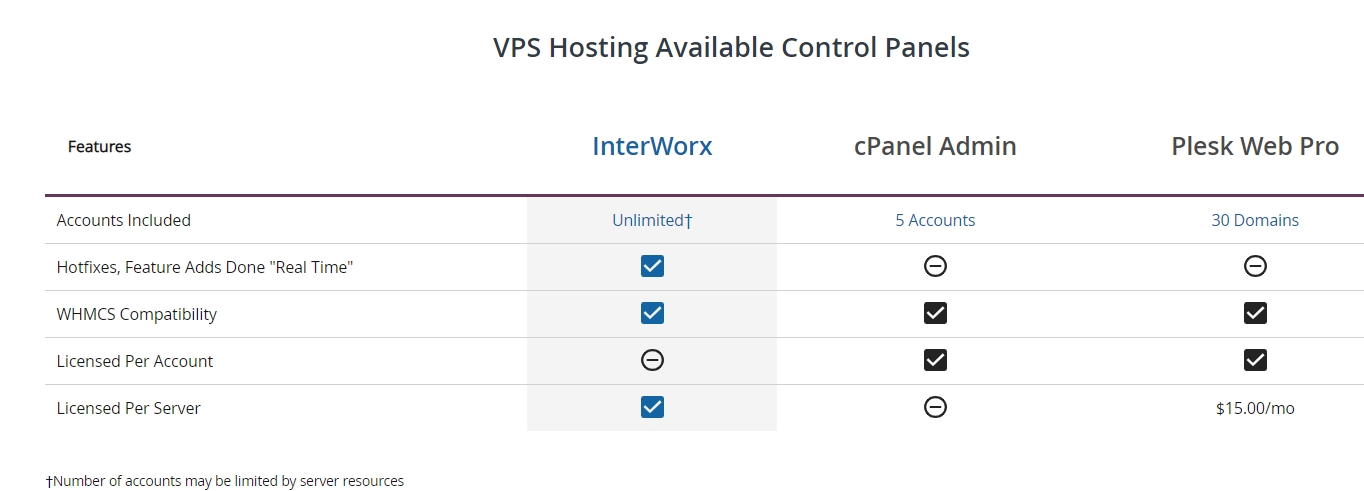
Liquid Web’s InterWox dashboard is quite logical to use. You can manage your account settings, backups, domains, billings, and other hosting-related services from there.
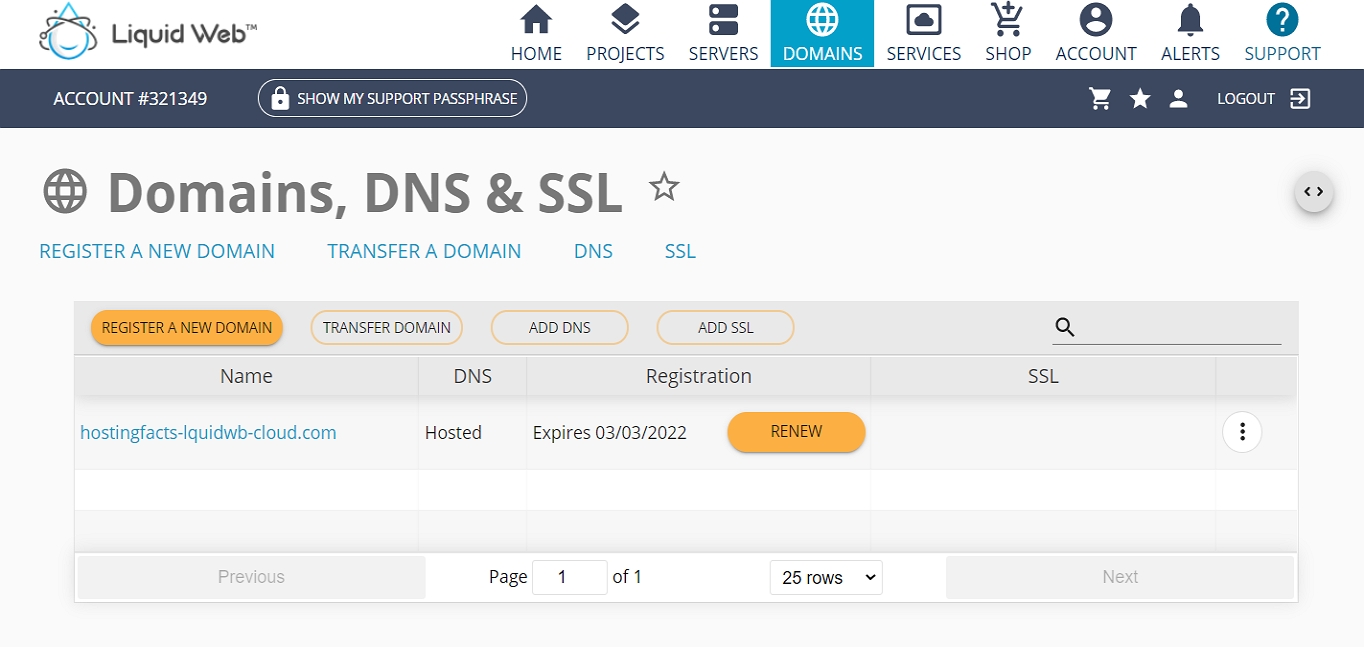
Overall, their custom control panel is easy to use and intuitive once you spend some time with it.
Cons of Using Liquid Web Hosting
Now let’s take a look at the downsides of Liquid Web hosting.
1. Free Domain Not Included
When you’re already paying for a premium service like Liquid Web, you want to make sure that you’re keeping expenses down. One prevalent free service that a lot of hosting providers offer is a free website domain.
Unfortunately, that is not included with any of the VPS plans offered by Liquid Web.
A free domain for at least one year is something a lot of other cheaper hosts already have in their plans. So, by not including a free domain, Liquid Web has added an additional expense ($15/year) on top of an already expensive service.
2. Expensive Pricing
Liquid Web is more expensive than a lot of the services that we have reviewed.
Typically, We look at shared hosting providers, and they have pretty low monthly costs. On average, we review plans that are $3–$7 per month (mostly with annual plans). The lowest price for Liquid Web Is a whopping $15 per month (with biannual payment) and it only goes up from there.
If you’re thinking to sign up for a year, the price would be $35/month and the monthly option would cost you $59/month.
3. No Shared Hosting
Shared hosting is far more affordable and better for small businesses and start-ups.
Unfortunately, Liquid Web has no option for shared hosting, with VPS being the most entry-level service available.
We feel as though Liquid Web is severely limiting its reach by pricing a lot of smaller businesses out. Subscribing to entry-level services like shared hosting allows a company to grow in comfort and then eventually upgrade to a service like VPS or dedicated hosting.
Liquid Web Cost, Plans, and Payment Methods
Liquid Web has several different plans available for VPS hosting.
Here are the Linux options:
| 2GB RAM Plan | 4GB RAM Plan | 8GB RAM Plan | 16GB RAM Plan | |
|---|---|---|---|---|
| Pricing | $15/month | $25/month | $35/month | $95/month |
| Websites | Unlimited | Unlimited | Unlimited | Unlimited |
| Bandwidth | 10 TB | 10 TB | 10 TB | 10 TB |
| Storage | 40 GB | 100 GB | 150 GB | 200 GB |
| Email Accounts | Unlimited | Unlimited | Unlimited | Unlimited |
Liquid Web also offers plans based on Windows servers starting from $54 per month.
These prices apply only if you sign up with them for two years.
Quick Facts
- Domain: No.
- Ease of Signup: Easy.
- Money-Back: Pro-rated, meaning you can cancel your plan at any time. You’ll get a refund for the unused days left on your invoice.
- Payment Methods: Visa, Mastercard, AMEX, Discover credit cards, PayPal, check, and wire transfers.
- Hidden Fees and Clauses: Pro-rated refund available only for monthly plans. Annual plans are prepaid and non-refundable.
- Upsells: No upsells.
- Account Activation: Quick activation.
- Control Panel and Dashboard: Three control panels to select from – Plesk, InterWorx, and cPanel.
- Installation of Apps and CMSs (WordPress, Joomla, etc.): One-click installs for most popular apps.
- Other Features: Dedicated IP, DDoS Attack Protection, Local Backups, Cloudflare CDN, and More.
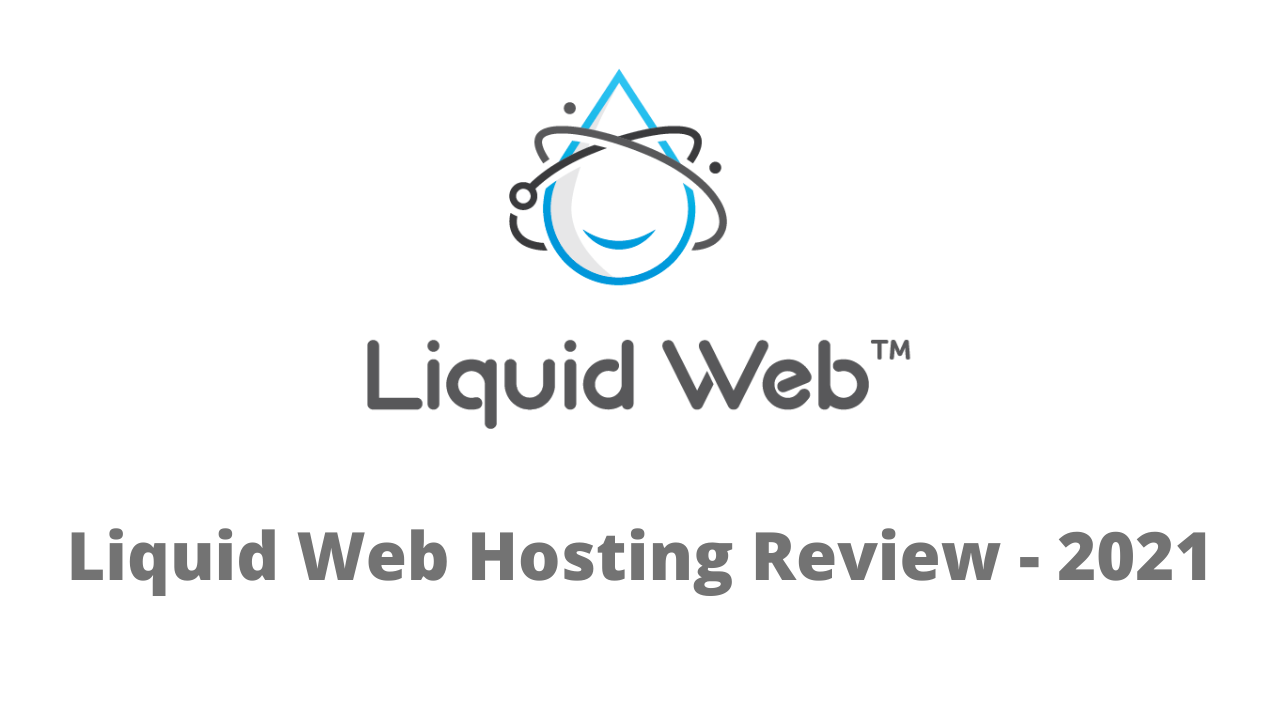



Average Rating